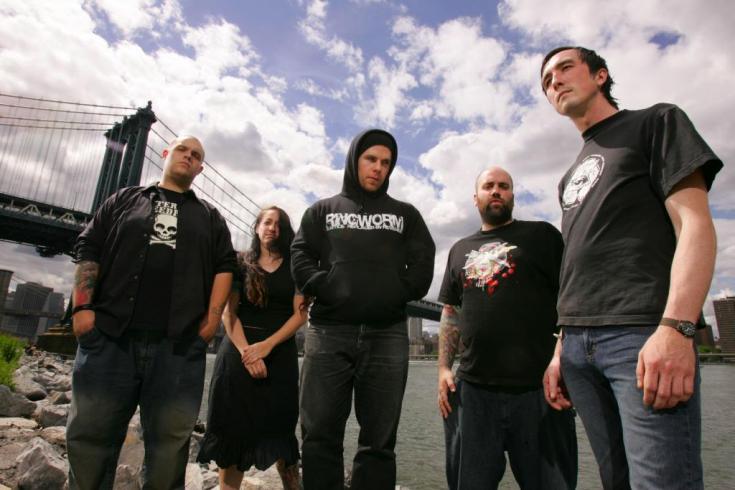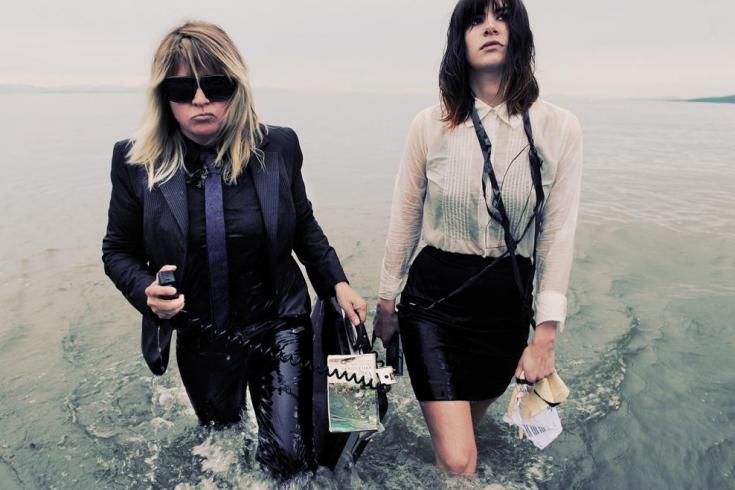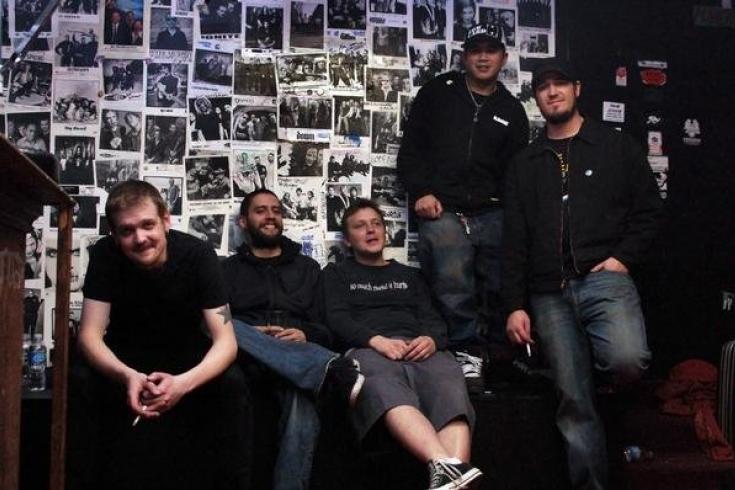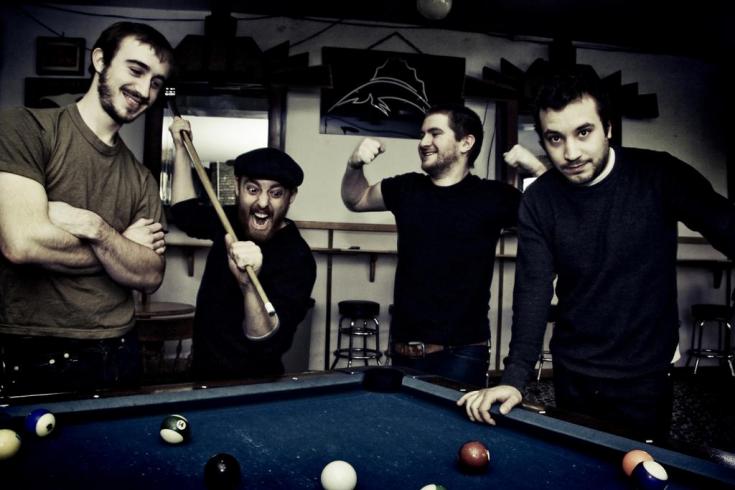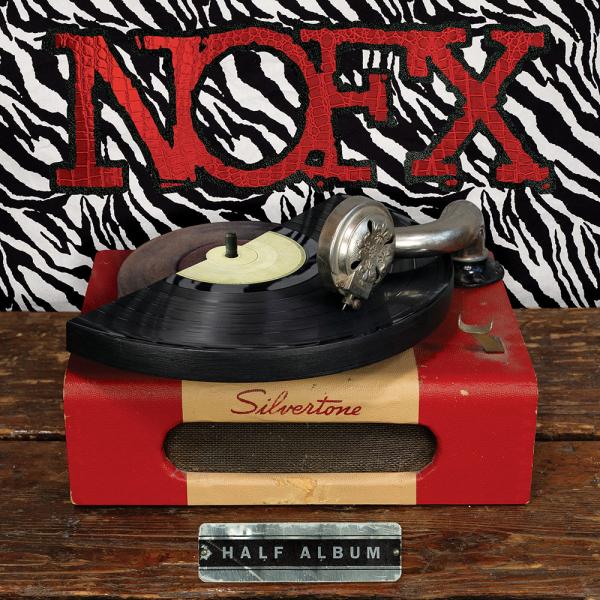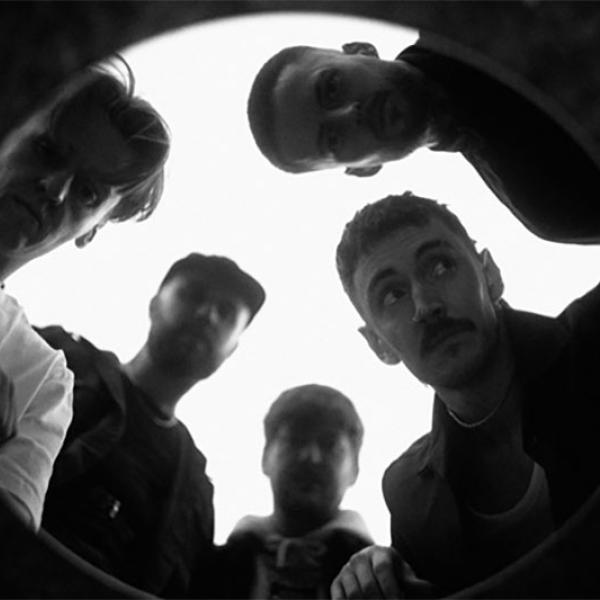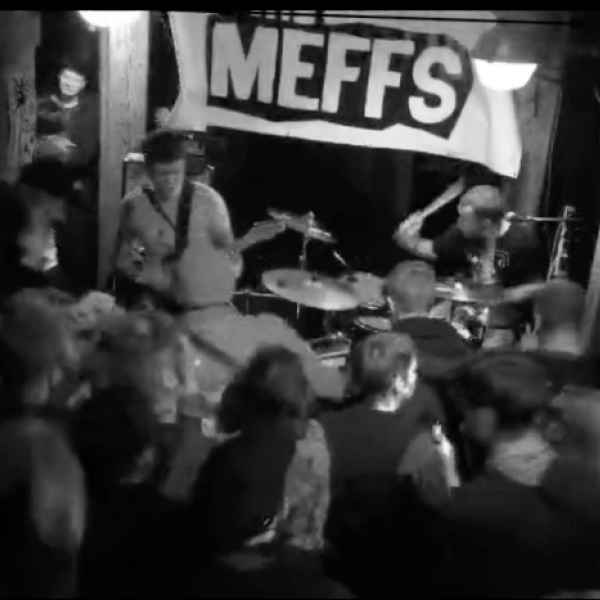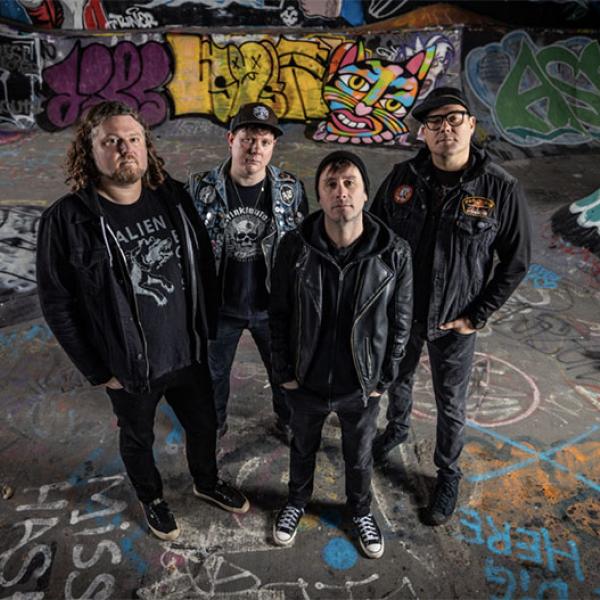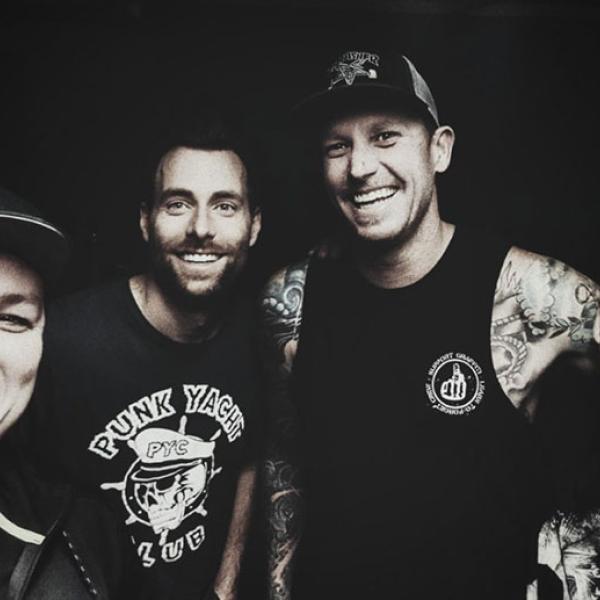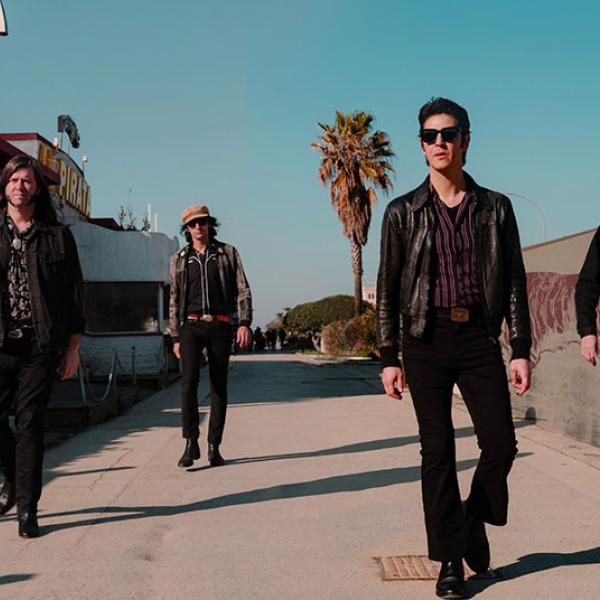Features
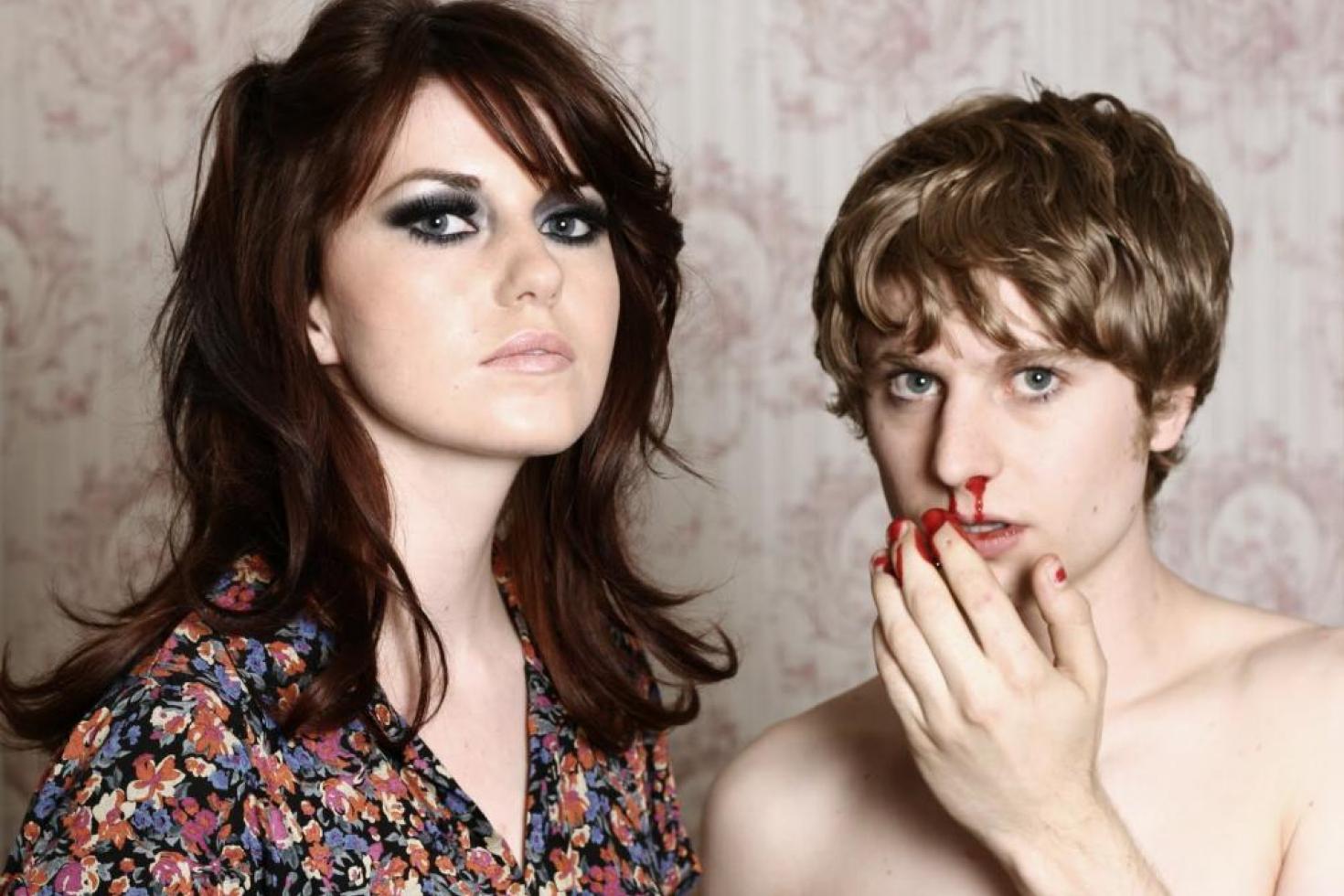
It has been proven that a band does not need a lot of instruments to provide an enormous wall of sound. More so, you only need two people: Laura-Mary Carter and Steven Ansell.
PRT: How has the tour been so far?
LAURA-MARY: It was quite long, but really good. I think it’s been the best tour we’ve had.
PRT: But you’re glad to go home?
LAURA-MARY: Well, we only go home for a few days and then we have to get going again. But I’m looking forward to sleeping at home, in my own bed.
STEVEN: I hate going home, it sucks. It’s not that home is so bad, but it’s just boring. Touring is more fun. I get bored really fast. When you go have after a tour, you need one day to normalize and then you just get really bored again. And then you think “I want to be back on tour.” I never know what to do.
LAURA-MARY: We’ll only be back for two days.
STEVEN: No, because we might need one day to get to London. So that’s one day.
LAURA-MARY: We’re going to Ireland, which should be fun, because we haven’t been there for a while.
PRT: How does it feel to play a small venue like tonight?
LAURA-MARY: We’ve played lots of small venues in lots of places. It varies. Sometimes we play very big shows and sometimes more intimate places like this. It’s what I expected tonight to be.
STEVEN: Even on same tours or in same countries the size of the venues can differ a lot. In Germany we get to play for 3000 people the one day, and 300 the next. This tour has been quite up and down.
LAURA-MARY: The major cities had more people. The Paradiso in Amsterdam has been the biggest crowd we played for.
PRT: With the second album you’ve tried to create more atmosphere. What kind of image did you want to portray?
LAURA-MARY: It’s more what we had in mind when we started the band. It’s more us. I guess we wanted to create a sound that represents our band more. And I think it does.
STEVEN: We wanted to create a more breedy atmosphere than on the first album. That is what we wanted to do on Box of Secrets aswell, but we didn’t get it right. It’s not a proper album if you ask me. I thought it was at the time, but it’s really not. It’s just a bunch of songs in a row, with no clear direction. This one has an overall feel that makes it more a real record. The songs fit more. There were songs we could have added, maybe better and more popular songs, but they didn’t fit. We were conscious about wanting an overall kind of feel. Which is the atmosphere people are talking about. I can’t describe it though. We knew what it was when we were making the album. If we could only describe it in words. We just knew that the sounds were right.
PRT: Was it more stressful to record the follow-up to quite a popular debutalbum?
STEVEN: The recording was not stressful. It went up and down during the writingproces. We had productive periods and we had insane moments when we thought we’d never be able to write the songs. Then we thought everything we had was shit. It was definately a weird time.
LAURA-MARY: When I think back… We toured loads in a year. And then we suddenly had to stop, go home and start writing new songs. Which is weird when you’ve toured so extensively and been to so many places. And to be at home and go to the studio where we wrote the first album, we knew we wouldn’t be able to travel and get inspiration from the places we see.
STEVEN: Now we’ve got our own rehearselroom and space, so it’s going to be much easier from now on. Now we can record ourselves.
When making this album, we got to a point where it’s you in a room, trying to figure out if what you are writing is any good. What we have always done is write, then tour, then write some more and tour again. As you’re doing it, you understand if it’s good enough. We’re lucky we have a label that is not pressuring us at all. Everyone said “go and do your thing, if you’re ready let us know, we will record it and put it out anyway.” But we fucking needed that. You really need some response. When you’re alone in a room, tuning it up, you’ve got no perspective on it at all. You don’t know if it’s good or if it’s shit and you don’t know if anyone cares. Our manager just keeps saying “it’s all cool, whatever you want to do is fine”. And that’s great, that’s what we wanted. We wanted a label and a manager that weren’t going to fuck about with our music. But at the same time there’s no reaction at all, and that freaks you out. Because you don’t know if it’s good or bad. We’re not playing it to anybody, we can’t see if any one’s reacting, we don’t fucking know. We’re sick of being in this one little fucking box trying to write. It’s fucking hard.
We broke the spell in the end, so that’s fine. On tour we’ve tried to play as many new songs live as we could in a row.
LAURA-MARY: Looking back at it, for me it’s just a big blur. It’s shocking to me that we actually finished the album, because I can’t even remember when we started writing the songs. But we did it. For me it’s really a blur.
STEVEN: And we had bits that weren’t finished, which we had to finish in the studio. But that worked actually. We didn’t start with nothing, but we did have to finish certain things.
PRT: Isn’t your life always like a blur?
LAURA-MARY: Yeah.
STEVEN: Pretty much. We were just saying how we never miss anyone. You never miss anyone, because you’re constantly looking forward to the next thing. And you never really think back. Unless someone makes you, like in an interview. Then they ask you “oh do you remember when this happened, or do you miss so and so…” And then you think “oh fucking hell, I haven’t seen that friend of mine in two years.” And that’s mental. Everything is like a snowball blur, running downhill. And you forget all this shit. Everything is a blur. And it doesn’t help when you constantly drunk.
LAURA-MARY: I’m thinking about becoming straight-edge.
STEVEN: Whoa whoa, that’s never going to work. That means I’d have to drink for both of us.
LAURA-MARY: You already do that.
PRT: Would you ever consider to make a video with a Twin Peaks-vibe?
STEVEN: It would be really cool, but we’d never do it. It becomes a gimmick if you keep going on about something.
LAURA-MARY: We did do a front-cover for a German magazine. We dressed up like the characters.
STEVEN: That was really fun.
LAURA-MARY: But that’s as far as it goes.
PRT: Who was the dancing dwarf?
STEVEN: Me. They put me on the front cover. Everyone kept saying “Steven looks fucking weird in this picture.” But if people don’t know Twin Peaks, it’s me in a red suit doing some weird dancing. I had to stand in the corner of a room to make me look really small.
LAURA-MARY: And I’ve got an eye-patch on.
STEVEN: They did a really good job, trying to recreate the scenery to make it look like Twin Peaks (U-Mag).
PRT: Is it important to you to have perfect control over every single detail of the songs and albums? Or do you just improvise on stage?
STEVEN: We do. It’s funny, because we’ve just grown into it. There’s this bit in the chorus of You Bring Me Down that we never sing. There’s one line in the recording that we don’t sing.
LAURA-MARY: What’s that?
STEVEN: We don’t sing it. Think about it. When you go into the chorus… it goes “I can’t I can’t”, and the third time we do it, we just don’t sing it. We haven’t done it for ages. When did that happen? See, you don’t even realise what I’m talking about. We totally do that. Isn’t that weird? If it’s working, and you’re so wrapped up in playing, you don’t even realise you’ve changed something. But you fucking have. Honestly, think about it.
LAURA-MARY: Yeah, I think I’m now getting what you mean.
STEVEN: Or if something goes wrong or breaks on stage, then you end up jamming and changing it.
LAURA-MARY: Last night we’ve changed it.
STEVEN: You did some different singing. If you’re not quite on form and you fuck about because you’re distracted… But if everything is working right then you can change things around. Everything is getting slower. We’re getting old. But every time I hear something slower, I think it sounds better. It has become our instinct to play as fast as possible. But everytime I hear us slow down, I think “shit, it’s way better.”
PRT: On the first album there was a more overall feeling of anger, whereas this one has more emotions. How do you portray these emotions on stage?
LAURA-MARY: We don’t know honestly.
STEVEN: I haven’t got a clue. The way we make stuff is like, we don’t think or talk about it, we just do it. It happens very instinctively. We both know when it’s right or wrong. Except when we lost our marbles in January. You don’t know what you are trying to say, or why is it this exact kind of feeling, but you just know it is this or that. It’s even a bit of a mystery to us, how the writingproces evolves. On stage it changes from day to day. Sometimes you’re playing and you’re really feeling the words you’re singing, and other times you’re enjoying that everyone is dancing to the music. The lyrics could be considered to be negative, but you can play them in a positive way because the people are reacting to them. That’s fun, because then you can feel how the energy can flip the song.
PRT: Doesn’t that contradict with the fact that you have a degree in philosophy? In the sense philosophers tend to over-analyse everything, but you don’t want that to happen with the music?
STEVEN: I can’t analyse, that’s why I never studied music. I don’t want to understand it, I don’t want to fuck it up. I think that if music works the way it does for us, when it’s based on a kind of instinct, if you start pulling it apart, you’ll probably loose it.
LAURA-MARY: You pull it apart in interviews sometimes, but you don’t want to pull it apart when you’re writing.
STEVEN: I never think about it unless we do interviews.
PRT: So you really dislike interviews, because then you have to overthink it and it doesn’t seem natural anymore?
STEVEN: I used to be cool about it, but now I don’t like interview as much anymore.
LAURA-MARY: It’s no fun anymore if we have to do promo for a new album. Then you start thinking about things you wouldn’t even think of. You analyse everything, and that’s not meant to happen.
STEVEN: With the first album, loads of people asked us questions and I found that interesting, because I started reflecting on stuff I hadn’t thought about. But the next time around it became clear that I was pulling it apart and I really didn’t want that. And I don’t like the fact interviews make me do that. It makes you confused about what you are doing, while I have a perfectly good view and instinct on this band. To a certain level, we know where we want to head to and what we are doing. But if we tend to steer it too much, it usually comes out wrong.
PRT: On your Myspace I read this whole rant about how you’re not an indieband. But obviously you hear other influences, like hardcore and punk. Does it still annoy you that you’re still being called indie?
LAURA-MARY: It used to annoy us a lot, but now I don’t care as much anymore. Because I realised that some people even think Sonic Youth is indie.
STEVEN: In America they have a different perception of indie. It’s because we’re from England that people immediately associate our music with that typical indie-sound, like from The Smiths and The Libertines. It’s a million miles away from everything we’re doing. It always has been. It’s probably because we’ve been in the NME too much in the beginning. Then people come and see us and they say “it’s not really indie. I don’t understand.” For fuck sake. Read our interviews, see what bands we talk about. Think about it.
LAURA-MARY: It is a bit annoying, but we got over it.
STEVEN: I find it funny though. Someone came to our show and saw Pulled Apart By Horses and said it wasn’t indie at all and that it was strange music. I said it’s probably the least strange music in the world: it’s one big fucking guitar riff and screaming. It’s the simpliest fucking kind of rockmusic, that’s why it’s brilliant.
LAURA-MARY: We’re actually more poppy.
STEVEN: Yeah, we’ve got vocal melodies.
PRT: Laura-Mary , if you go to a guitarshop, what song do you play to test it?
LAURA-MARY: No one has ever asked me that. The funny thing is, I never go to guitar shops. I found the guitar that I liked and I just bought loads of them. The first time I actually went to a guitarship in a while, was in this street in London where they have lots of shops. I went in there and I thought I wanted to go back. But I walked in and someone was playing Razorlight… That’s why I don’t like going to guitarshops, because you’re just sitting there and then everyone’s looking at you. It’s all quite male-dominated. When I was younger, I was put off by this thing in a shop once. I used to go there a lot, because I really want to play the guitar. I remember the people who worked there were really rude to me, saying “oh, that’s a nice colour isn’t it?” That really put me off early on. But now I feel more comfortable to go. I think I’m going to buy an acoustic guitar when I get home.
PRT: Is there a song you really like to play on your guitar?
LAURA-MARY: I like to play this way called Wash Up by Slint. And a Distiller song. I can’t remember the name. Teenage…Something. I don’t know. The first song on the album.
PRT: Would you ever play an acoustic gig or session?
LAURA-MARY: I’d say never say never, but we’ve never played one before.
STEVEN: We’ve refused every time anyone asked us.
LAURA-MARY: We could do an unplugged thing.
STEVEN: Like MTV Unplugged? We couldn’t play the songs we have now acoustic.
LAURA-MARY: I don’t know, we could make acoustic versions.
STEVEN: Well Laura can play them acoustic, I’ll just sod off.
LAURA-MARY: No, you could play with brushes.
STEVEN: Fuck that! What’s the point in playing with brushes?
LAURA-MARY: Or you could play the guitar aswell and we’ll both sing. But I don’t know if I would want to do that, I’m just not saying we’ll never do it.
STEVEN: Ok, you never know. It could be that the stuff on the next album works better that way. But at this point we’ve always refused. It wouldn’t be right if we played the songs acoustic.
LAURA-MARY: I don’t know, it might be interesting to see what it would be like.
PRT: What comes first in the writing process?
STEVEN: The riffs. The guitar and the drums.
LAURA-MARY: Then the melodies and lyrics. Lyrics are always last, I don’t know why that is.
STEVEN: Sometimes we have most of the music and just little bits of lyrics. So we have a bit with the lyrics, and then an instrumental part for which we still have to write the words.
PRT: Is pressure a general curse or can it give a stimulating effect?
LAURA-MARY: It can do both. Sometimes a little bit of pressure helps. Or if someone says we can’t do something, then it’s a big push for us to prove them wrong.
STEVEN: It would be boring if we didn’t have any pressure. We generate a lot of pressure upon ourselves. More than most of the people actually. We were the ones being really obsessed with certain things not being good enough.
PRT: So you are real perfectionists?
LAURA-MARY: I guess so. Because now I can see all the imperfections of the record.
PRT: Do they bother you?
LAURA-MARY: A little bit, yeah. But I still definitely love our album. And the first one aswell. You find flaws really quickly, but then you know you can make it better again.
STEVEN: It’s good, because it gives you clarity on the way you work. Then you know what to do next time around.
LAURA-MARY: If we play a bad gig, then we’re always looking forward to the next day, so we can make it a better one.
PRT: How was the general response to your new album?
LAURA-MARY: People hate or love it.
STEVEN: It was much more extreme. Of the first record, nobody said it was absolutely amazing or that is was really shit. They just said it was pretty cool, they might be able to do more, we don’t know. Of this one they either say it’s utter shit or it’s amazing. I much prefer that reaction. People either really don’t get it, or they give it an 8 or 9. The ones I’v read at least. It’s either 2 or 3 out of ten, or 8 or 9. And it got 5 out of 5 somewhere.
PRT: Do bad reviews bother you?
LAURA-MARY: Well, we got a bad review from Q. We were a bit gutted, because they gave us a really good review the first time. We wanted to get a feature in the magazine, but the review was just ridiculous.
STEVEN: It was a one- sentence review.
LAURA-MARY: The reviews of the gigs affect us more, it’s more personal. Because if you’ve given a good gig, and then someone starts analysing it, it can give you a bad feeling.


